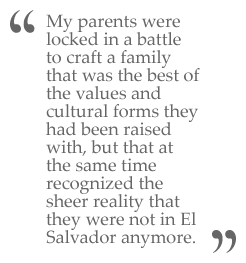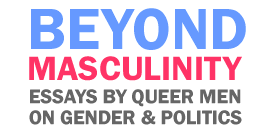It is
my goal to fashion a queerness that resists assimilation
by the forces of oppression through its political
orientation and its gressive way of being. In these
times of American Empire and the straightening of
gayness, all of us have an ethical responsibility to
resist, no matter how small such resistance might seem.
Like the race mixing that mestiza/o has
traditionally referred to, I am interested in creating a
gayness that is a mixture – imperfect, always in process
of becoming, yet resisting with all of its might. It is
towards that end, that I write these notes, themselves
imperfect and in process of articulation.
Border Clashes
My childhood experiences in the vast
stretches of Los Angeles were defined by a constant
shift between two separate worlds firmly divided by a
border made up of language, class, and race. The Salvadoreño culture of my home and neighborhood in the
eastern San Fernando Valley was an island in the
surrounding sea of Americanness. Moving from the Spanish
of my family to the English of my teachers and school
forced me from an early age to be constantly aware of
the need to shift my way of being depending on where I
was. Who I was depended on where I was, who I was with
and what language I was speaking. Like many budding homo
boys, the need to constantly move back and forth between
worlds made me a talented performer from an early age. I
quickly became a skilled border-crosser.
 At the very core of my role switching was a
fundamental clash between the migrant gender-sexuality
worldview of my family and the “native” system of the
United States. My parents were locked in a battle
-internally and externally - to craft a family that was
the best of the values and cultural forms they had been
raised with, but that at the same time recognized the
sheer reality that they were not in El Salvador anymore.
This battle was never explicitly named by my parents as
the source of their discomfort with my brothers’ and my
own rapid Americanization, but it quietly informed every
action they took.
At the very core of my role switching was a
fundamental clash between the migrant gender-sexuality
worldview of my family and the “native” system of the
United States. My parents were locked in a battle
-internally and externally - to craft a family that was
the best of the values and cultural forms they had been
raised with, but that at the same time recognized the
sheer reality that they were not in El Salvador anymore.
This battle was never explicitly named by my parents as
the source of their discomfort with my brothers’ and my
own rapid Americanization, but it quietly informed every
action they took.
It
was often my grandmother who most vocally expressed this
conflict to my brothers and me. As a domestic worker in
the affluent West San Fernando Valley, my grandmother
was exposed to the dirty laundry of the rich and white.
Daily, she would clean the most intimate spaces and
garments of white people, all for less than $50 a day.
Whether out of a need to simply vent or as a means to
recapture her sense of agency, she would convey horror
stories of disgusting habits of personal hygiene, drug
abuse, and broken families. These stories served as the
morality tales of our immigrant home in a new land full
of material promise and cultural perils. In particular,
many of her stories centered on the polluting affects of
the menstruation of the white teenage girls of the
families she cleaned for. Often her stories about
menstruating white girls would end emphatically with the
statement, “¡Son tan cochinas!” [ 6 ]
Her stories taught me that everything “out there”
- that is everything outside of the home -was tainted.
In my grandmother’s stories, moral and physical
pollution awaited us in the outside world, which she
represented through the polluting bodies of menstruating
white teenage girls. The vivid images of dirty white
girls my grandmother painted reinforced my already
emerging sense of white people’s racial, class and
sexual differences.
Either consciously or unconsciously, my grandmother’s
conflation between white women and moral contamination
served to mark not only whiteness as deviant but also
femaleness. The unnamed ghost lurking in all her stories
was the polluting vagina. Frightening pictures of
bleeding white girls stalked my imagination every time I
left my home and entered the world “out there.”
This unease made me afraid of the unknown, which often
meant the white and the female. In the world my
grandmother constructed, white girls stood in place for
the larger contaminating threat of American culture. In
my grandmother’s equation, white girls were inherently
tainted because American culture was tainted. In warning
us away from polluting white girls my grandmother was in
the same moment both resisting assimilation into white
Americaness and perpetuating the misogynistic
construction of women as polluting to men and society at
large.
Home itself was a confusing space.
Patriarchy was the central axis around which my parents
constructed our family. My father worked an inhuman
amount of hours as a machine-shop operator to support my
family, but his salary was simply not enough to make
ends meet. In the rapidly de-industrializing Los Angeles
of the 1980’s, machine-shop work was on the decline. My
father’s lack of an American education and legal status
exacerbated the dwindling supply of work, resulting in a
continuous cycle of migration from one job to the next.
This instability finally forced my father to allow my
mother’s entrance into the working world. Like my
grandmother and aunt, she too became a domestic worker
for the rich and white of the West San Fernando Valley.
The
emergence of my mother as our family’s co-supporter led
to fierce fights for dominance and power within our
home. Quite simply, my mother’s departure from her
traditional role as homemaker undermined my father’s
masculinity. The assault on my father’s manhood was
twofold. Since he couldn’t fully provide for all of our
family’s financial needs, he was failing at his manly
obligations. This was compounded by the loss of mental
and physical control over my mother. It was perhaps the
loss of total control over my mother that most
undermined my father’s masculine power. With work, my
mother gained independence as she learned how to drive
and for the first time had money of her own to spend.
Implicit in my father’s frustration was the fear that
her daily sojourns to the outside world would corrupt my
mother and render her unfit as both mother and wife. My
father’s fears would explode in dramatic and often
violent outbursts aimed particularly at my mother, but
also at my brothers and me. These poverty-driven
gendered struggles set the stage for the emergence of my
queerness within my family... (continue reading)




5 COMMENTS ON THIS ESSAY:
Great essay!Very proud of you for writing this.
GREAT ESSAY!!! good work.
amazing!
i'm so very proud of you, Daniel.
hello daniel
i was wondering, is there maybe a spanish version of your article?
(i would like a spanish/french friend of mine who's lived in latin america for some years to read your piece, and english is difficult for her)
daniel mang
toulouse/france